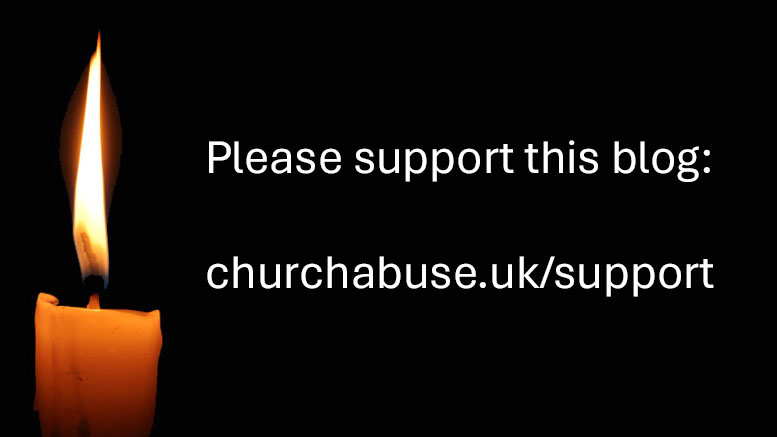The Most Revd and Right Hon Stephen Cottrell
Archbishop of York
9 January 2025
Dear Stephen,
This is an open letter which will be published today at churchabuse.uk, as will any response you provide.
As you know, I believe that your dishonesty about safeguarding failings makes you unsuitable to be a bishop in God’s church. Your Epiphany letter to clergy and lay leaders in the Church of England reinforced the fears that I had when Justin Welby announced he would step down as Archbishop of Canterbury: that those remaining would pretend that his resignation would be a turning point and that real reform would now happen.
In a blog post after his resignation was announced, I said: “The Church of England does not need a scapegoat resignation. It needs wholesale reform. Justin Welby’s resignation should not be used as a fig leaf to hide the real continuing re-abuse of victims that regularly takes place in the Church.”
And yet this is what your Epiphany letter does: it talks about change, and then highlights some activities that were already happening. You then challenges victims, survivors and advocates to “support for these proposals”.
A better letter for victims, survivors and advocates would be “tell us if these proposed changes will work”, rather than asking us to support flawed proposals that will not make the Church of England a safer place.
I read your letter with anger. As I prayed about what my response should be, I moved from shredding your claims to pieces to taking you at your word. This is something that doesn’t come easily, because from experience, your word on safeguarding is generally not something that has proved to be trustworthy.
But while I have real concern about the forthcoming changes (of which I will blog about in the next few days), I was struck by the words you chose to close your letter with: “Let us commit ourselves to becoming . . . the safer and more accountable Church I believe we are called to be.”
So, I’ll take you at your word that you want the Church of England to become more accountable. In that spirit, would you please be accountable by answering some questions?
After all, how can the Church be more accountable if it continues to keep things hidden?
- Recent BBC Radio 4 File on Four programmes have highlighted issues with safeguarding risk assessments and the difficulties in taking action against clergy who potentially pose a risk. These include The Priest and the Pay Off, about the Revd Canon Andrew Hindley at Blackburn Cathedral; and The abuse survivors calling on archbishop of York to resign, about the Revd Canon David Tudor.
I have two questions about this:
- How many clergy in the Church of England hold office or a licence despite having restrictions on their ministry following safeguarding risk assessments?
You may say that you do not have this information, because it is down to dioceses; but surely every diocesan bishop who have such clergy in their ranks would need to have consulted the National Safeguarding Team (NST). The NST is a function of the Archbishops’ Council. You are a trustee and President of the Archbishops’ Council, so you should have this information.
For clarity: I am not asking you to disclose any information that would be protected under GDPR or the Data Protection Act, as I am not asking for any personal data – just a number. - The former Bishop of Blackburn, the Right Revd Julian Henderson, called for new legislation to allow bishops to take more decisive action in cases like that of Andrew Hindley. The revision committee for the last Miscellaneous Provisions Measure called for this to be introduced urgently. We now know, that you were also aware of the problem because of the situation with David Tudor.
Did the Archbishops’ Council ever discuss Bishop Julian’s concerns about the inadequacy of clergy risk assessment regulations, what did the Archbishops’ Council decide, and will you publish the relevant minutes? When will the clergy risk assessment regulations be strengthened to give bishops power to act when clergy are shown to pose a risk to children and vulnerable adults?
- How many clergy in the Church of England hold office or a licence despite having restrictions on their ministry following safeguarding risk assessments?
- My MP was rebuffed by the Church Commissioners when he asked a parliamentary question about legal aid given to bishops to defend themselves against allegations that they have failed to follow safeguarding rules. The Second Church Estates Commissioner, Marsha de Cordova MP (Labour, Battersea) replied (using, no doubt, words prepared by employees of the Archbishops’ Council): “It is not the practice of the Church Commissioners to disclose expenditure on the costs of legal proceedings of this kind.”
In the spirit of accountability, as you are a Church Commissioner and a member of its board, would you change this practice and reveal how much the Commissioners have paid to bishops to defend against allegations that they have failed to follow safeguarding rules? - The Charity Commission has confirmed that it is “engaging with church leaders on the recommendations from the Makin Review to ensure that any areas that need addressing are done so swiftly.”
Who from the Archbishops’ Council is the Charty Commission engaging with? Does this include the secretary general, William Nye? - The victim and survivor Gilo has been treated appallingly by the Archbishops’ Council.
It has been shown that the church’s response to the independent lessons learned review in his case was to hold “reputational management” meetings with Archbishops’ Council safeguarding and communications staff, the Ecclesiastical Insurance Group and secretary general William Nye.
Gilo’s complaint about William Nye’s involvement was originally dismissed on the basis that Nye wasn’t present at this reputation management meeting. It has since transpired that he was.
Gilo’s solicitor wrote an official complaint to you and Justin Welby in July 2023. It is now January 2025 and a formal response to that complaint is STILL awaited.
- If you really want the Church to be accountable as you say, why is it taking so long for Mr Nye and those who dismissed the original complaint to be held accountable?
- Can you publish the complaint policy and procedure that is being followed in relation to the complaint against William Nye?
- Can you confirm how many complaints have been made against William Nye’s handling of safeguarding matters and the outcome of those complaints?
- If you really want the Church to be accountable as you say, why is it taking so long for Mr Nye and those who dismissed the original complaint to be held accountable?
As I said, my initial reaction to your letter was to dismiss it as yet more “fine words but no action”.
But I have decided to give you the benefit of the doubt. If your commitment to becoming an accountable church is more than “fine words”, you should have no problem answering my questions.
If you refuse to answer these questions, then we will know for sure that despite these latest “fine words”, no action will follow and your words at epiphany are as hollow as your words have been over the years.
There are more questions that deserve answers. I – and no doubt others – will want to ask these questions in the coming weeks. IF you mean what you said about the church becoming more accountable.
Is Justin Welby’s resignation really a turning point for the church? Or will you use it as a fig leaf to pretend that things have changed?
Yours sincerely
Gavin Drake


Thank you for hosting this superlative site. In you, we who have been victims of clerical abuse, (in my case, psychological, threatening, menacing, by the vicar where I ran a bookshop), have the most able of advocates.
Bishops have lost all credibility. They have no place in the Lords. History will not forget Welby’s farewell speech to his fellow lordships after resigning. If that had been a scene from “All Gas and Gaiters”, it would have been deemed totally implausible! What an ass! It’s a pity Welby didn’t tell us more about Simon of Sudbury: he remains at Canterbury with a cannon-ball in place of a head. How appropriate.
I am concerned that the Rt Rev Glyn Webster has been reinstated by Archbishop Cottrell as a vicar at All Saints in York after Bishop Webster resigned in disgrace after being severely teprimanded by an enquiry into his case. Cottrell had assured Matthew Ineson that Webster was leaving the ministry. How two-faced!
“Church is people and relationships and your connection with the Almighty. It’s not a building. It is not an institution.”
“Institutions are man-made and they are always going to be flawed, which is why I always keep a bit of distance from them. Our job in life starts with our neighbour. It is people, kindnesses, acts of love and quiet moments of connection with you and the Almighty.”
Bear Grylls comments in today’s Daily Tele (11.1.25) are possibly relevant.
A consequence of abuse cover ups is plain. ‘Pay up and shut up’ Churchianity is dying. ‘So pleased to have you as a member of the Church family-just pay up and shut up’. Good riddance to ‘pay up and shut up’. The NT describes the power to demolish strongholds. That is what we are seeing at the minute in the C of E.
To stay, but not pay, may be better than leaving the Church. The next few years will see positive change. Dropping the slavery reparations would be a great start.
Thank you for your questions in your open letter to the Archbishop.
There were five bullet points covering the Archbishop’s safeguarding priorities in his Epiphany letter.
I have written to the Archbishop for clarification on where the on-going debate on The Seal of Confession lies within these five priorities. (This work has been highlighted as a good example of survivor-engagement, though the long-finished report remains unpublished).
I have consistently argued for ‘Privacy, not secrecy’.